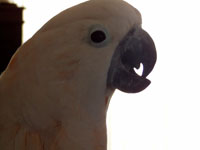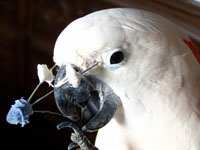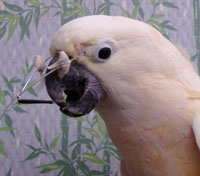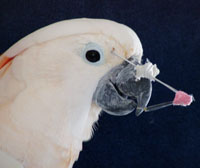
The Cockatoo Who Wore Braces |
When we brought Dusty home from a local pet store at 4 months of age, we knew she was special. She was a gentle and curious young bird, but she had some challenges. Not only did she have several black crest feathers, but she had an underbite - the top part of her beak (the upper mandible) sat inside the bottom portion (the lower mandible). Both conditions were likely the result of poor nutrition prior to weaning. Lots of good food easily solved Dusty's feather problem, but her beak was another matter entirely. A parrot's beak grows continuously, but its length is usually kept in check through normal wear. Dusty's underbite meant that her beak did not wear down properly. She had to visit the vet every 6-8 weeks and have her beak trimmed with a grinder so that it would not become overgrown. Despite our veterinarian's gentle handling and careful approach, these visits were very traumatic for Dusty, and we were very concerned that she faced a lifetime of stress. When Dusty was 6 years old, we received some wonderful news. While attending a conference, our vet* learned about a new surgical procedure that might correct her beak. After much discussion, we agreed that the opportunity for her to have a normal beak far outweighed the risks of surgery, and we made the decision to proceed. Stainless steel pins (the same as those used to repair a broken bone) were inserted through Dusty's sinus cavity and upper mandible. This triangle-shaped structure extended out in front of her face, beyond her beak. A wire was fastened to the tip of the upper mandible, and it was connected to the pin structure. At first, a thin piece of wire was used as a connector, but this was later switched to a rubber washer. The resulting tension stretched Dusty's muscles over time, and frequent trimming re-shaped her beak. Her courage, trusting nature and good spirits helped Dusty get through 10 difficult weeks of wearing braces. At first, she could eat nothing but soft foods like cooked peas, corn and baby food, and even these had to be hand-fed. Later, when she was again able to eat on her own, she needed huge new food bowls in order to accommodate her braces. For safety reasons, she could not play with our other birds, and it was impossible for her to play with her toys. But, with incredible support from our vet and lots of TLC for Dusty, we all made it through together. The day she had her braces removed, Dusty was ecstatic. Almost overnight, she became a much happier, more confident and outgoing bird. Her beak isn't perfect and she still needs to go to the vet to have it trimmed, but there's no doubt that this was a real success story! *For the past 30 years, we have taken our pets to The Links Road Animal and Bird Clinic here in Toronto. Dr. Evan Mavromatis was responsible for Dusty's beak surgery, with help from Dr. Rick Axelson and the entire Links team. Specializing in birds and exotic animals, The Links team is simply the best pet healthcare team anywhere! |
 |
|
 |
|
 |
|
|
|
